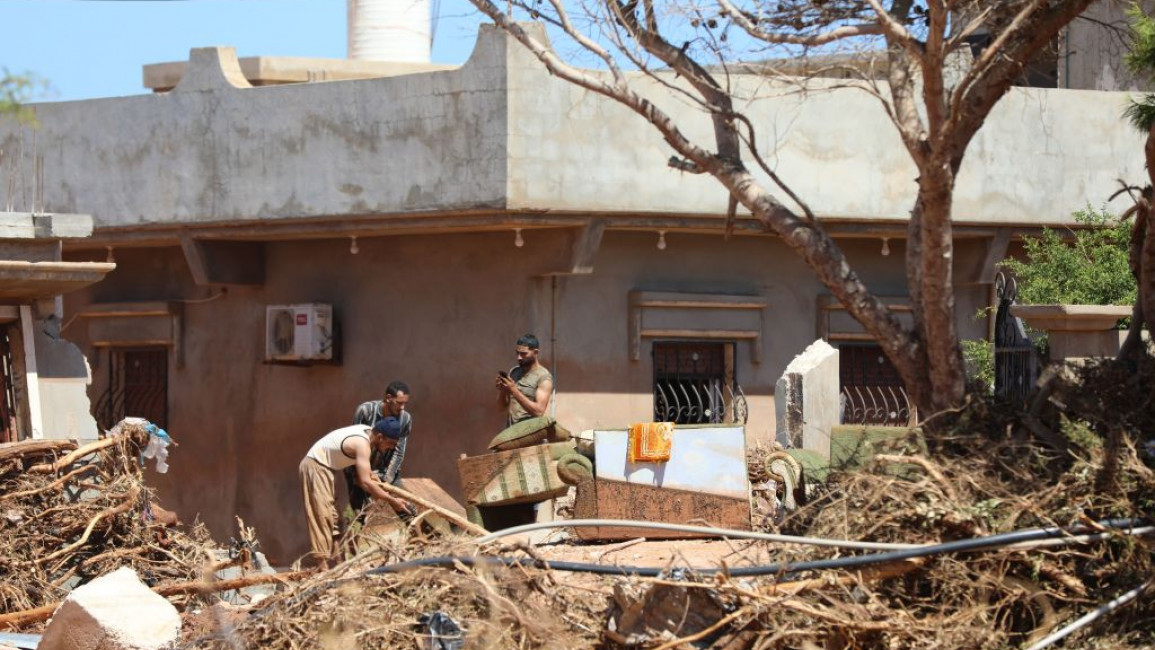Libya flood crisis 'national disaster', aid group says, warning of winter storms
Flooding has devastated the Libyan port city of Derna but an aid group on Friday said the disaster was national, warning of further storms in winter.
The powerful Storm Daniel hit northeast Libya on Sunday, leading to flooding that has left tens of thousands displaced or dead.
A cataclysmic deluge hit Derna, the place most heavily impacted, but other areas affected include the cities of Al-Bayda, Al-Marj, and Soussa, and the town of Shahhat.
"This is beyond just one city [Derna]. This is a national disaster really and winter is gonna sweep across and, you know, more rain, more storms," Ahmed Bayram, Middle East media adviser at the Norwegian Refugee Council (NRC), told The New Arab.
NRC has over 100 staff working in Libya and almost all of them are Libyans, Bayram said, adding that a "big chunk" were dedicated to the flood crisis.
'Keep the focus on Libya'
Bayram, who warned of the outbreak of disease and, in the case of Derna, expressed concern over reports of remnants of war and unexploded mines being swept across the city, called for the media to keep reporting.
"We've seen with other disasters that as soon as we're done with the visuals, we're done with the headlines and the soundbites, the story is left there and that shouldn't happen," he said.
"This is not to point a finger at the media. We need help to keep that story [in the headlines], to keep the focus on Libya. And the media's done well to highlight these stories, even though it's been very hard."
"It's a disaster in every sense of the word!" - this man encapsulates the depth of Libya's heartbreak as the North African country reels from devastating floods this week 👇
— The New Arab (@The_NewArab) September 15, 2023
🎥: @alexander_durie #StormDaniel pic.twitter.com/UBs716x1rv
Bayram said on Friday that the NRC is offering people in the city of Benghazi blankets, mattresses and hygiene kits for babies and women and hopes to start doing the same in Derna in the next 24 to 48 hours.
He later said NRC was in Shahhat on Friday and hoped to be in Derna the following day.
'The time for accountability will come'
Salah Aboulgasem, deputy director of partner development at Islamic Relief, called on the international community to help prevent a further humanitarian crisis in Libya.
"We want to give a message to [the] international community that what's happened has happened. The time for accountability will come. We totally understand and appreciate there should be accountability," he said.
"We have to prevent a second humanitarian crisis. That second humanitarian crisis is the waterborne diseases, the absence of food, the absence of shelter, the absence of vital medical supplies.
"There are many challenges. Support organisations like ourselves in order to enable us and equip us to reach the people. We have the know-how. We have the experience. We have the ability. We have the access."
The International Federation of the Red Cross and Red Crescent Societies, the International Committee of the Red Cross, and the World Health Organization said in a press release that the bodies of those who die after being wounded in natural disasters are almost never a health hazard to communities.
But the organisations added that dead bodies near or in water supplies can result in health concerns in any context.
Islamic Relief has reached just over 5,000 people in Derna and Al-Bayda, providing food, blankets and mattresses, Aboulgasem said.
Its first delivery to Derna took place on Wednesday, with a second occurring on Thursday, he said, and the group now has a permanent presence there.
Soussa was accessible, he added, saying Islamic Relief had completed a needs assessment there and was waiting for more information.
The UN had previously said the city was inaccessible and Bayram, the NRC media adviser, earlier on Friday said there were conflicting reports about whether it was open.
Conflict, climate
Libya has two rival governments and continues to reel from fighting that broke out in 2011 and killed dictator Muammar Gaddafi, ending his decades-long rule.
"Even before the devastating flooding, Libya was already grappling with the consequences of prolonged conflict and crisis, leaving approximately 800,000 people in desperate need of humanitarian assistance," Elie Abouaoun, the International Rescue Committee's Libya director, said in a press release.
"The overwhelming amount of rain that fell, combined with ineffective early warning systems and preparedness measures and critical infrastructure in bad repair, deepened this humanitarian crisis.
"Although Libya is middle of the pack among climate-vulnerable countries, Storm Daniel shows that the worsening impacts of climate change can perfectly target weak points to cause great damage."
Experts link the increasingly frequent extreme weather episodes being experienced across the world to climate change.
Abouaoun said climate-vulnerable, conflict-impacted communities are often marginalised in global climate action efforts and get a disproportionately small portion of funding.
"The dominant focus of climate action remains emissions mitigation, while critical aspects such as adaptation, anticipatory measures, and building resilience are underemphasised," he said.
"With tools and the technology to predict disasters like Storm Daniel – and therefore plan and enact an early response – anticipatory action may have lessened the damage of the storm."



